Clinical SAS Training in Chennai
Offering a robust educational pathway for individuals, Clinical SAS Training in Chennai is for individuals aspiring to a career in clinical research and data analysis. This program from Clini Launch typically provides comprehensive instructions in SAS programming, focusing on its applications in managing, analyzing, and reporting clinical trial data according to industry standards like CDISC.
- 100% Placement Assistance
- Hands-on Experience
- Globally Recognized Certifications
- Industry-ready Curriculum
Get prepared for roles in Pharmaceutical Companies and Contract Research Organizations.
Live Online Classes starting on 8th, 15th, 22nd & 30th.
Book Your Free Demo Class Today!
Clinical SAS Training in Chennai
Offering a robust educational pathway for individuals, Clinical SAS Training in Chennai is for individuals aspiring to a career in clinical research and data analysis. This program from Clini Launch typically provides comprehensive instructions in SAS programming, focusing on its applications in managing, analyzing, and reporting clinical trial data according to industry standards like CDISC.
- 100% Placement Assistance
- Hands-on Experience
- Globally Recognized Certifications
- Industry-ready Curriculum
Get prepared for roles in Pharmaceutical Companies and Contract Research Organizations.
Live Online Classes starting on 8th, 15th, 22nd & 30th.
Book Your Free Demo Class Today!

IAO & IAF Accredited Course

LSSSDC Membership

Practical Industry Exposure

Industry-led Expert Trainers
Our Courses

Certification in Clinical SAS
Gain expertise in handling and transforming clinical trial data, utilizing SAS and cultivate abilities in generating reports and visual representations for clinical investigations.

Advanced Diploma in Clinical SAS
With an in-depth examination of the intricacies of overseeing and guaranteeing the safety of pharmaceutical products across their entire existence.
Career Paths after Clinical SAS Training in Chennai

Clinical SAS Programmer
Clinical SAS Programmers utilize SAS software to develop and refine code for various essential tasks within clinical trials, encompassing data handling, statistical examination, and report creation.
Key Responsibilities: Craft SAS macros, templates, and tools for data refinement and reporting processes.
Clinical Research Associate
These professionals collaborate closely with clinical data managers and biostatisticians, employing SAS software to oversee data and report on trial advancement.
Key Responsibilities: Supervise clinical trials, ensure compliance with study guidelines, manage data collection, and liaise with researchers.

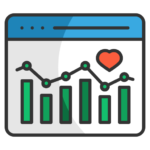
Pharmacovigilance Analyst
Pharmacovigilance Analysts track the safety and effectiveness of pharmaceutical products after their market introduction.
Key Responsibilities: Examine post-market data, pinpoint potential hazards, and submit reports to regulatory bodies.
Biostatistician
Leveraging SAS software, Biostatisticians apply statistical concepts and methodologies to analyze clinical trial data concerning the efficacy and safety of medications or treatments.
Key Responsibilities: Design research studies, interpret findings, and communicate results effectively.
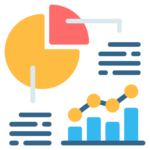

Clinical Data Analyst
These specialists work intimately with SAS software to scrutinize patterns, tendencies, and possible problems within the data, delivering valuable insights for research and development initiatives.
Key Responsibilities: Gather and document data, investigate data patterns, produce reports, and develop systems.
Career Paths after Clinical SAS Training in Chennai
Clinical SAS Programmer
Clinical SAS Programmers utilize SAS software to develop and refine code for various essential tasks within clinical trials, encompassing data handling, statistical examination, and report creation.
Key Responsibilities: Craft SAS macros, templates, and tools for data refinement and reporting processes.
Clinical Research Associate
These professionals collaborate closely with clinical data managers and biostatisticians, employing SAS software to oversee data and report on trial advancement.
Key Responsibilities: Supervise clinical trials, ensure compliance with study guidelines, manage data collection, and liaise with researchers.
Pharmacovigilance Analyst
Pharmacovigilance Analysts track the safety and effectiveness of pharmaceutical products after their market introduction.
Key Responsibilities: Examine post-market data, pinpoint potential hazards, and submit reports to regulatory bodies.
Biostatistician
Leveraging SAS software, Biostatisticians apply statistical concepts and methodologies to analyze clinical trial data concerning the efficacy and safety of medications or treatments.
Key Responsibilities: Design research studies, interpret findings, and communicate results effectively.
Clinical Data Analyst
These specialists work intimately with SAS software to scrutinize patterns, tendencies, and possible problems within the data, delivering valuable insights for research and development initiatives.
Key Responsibilities: Gather and document data, investigate data patterns, produce reports, and develop systems.
Eligibility Criteria for Clinical SAS Training in Chennai
Eligibility criteria for Clinical SAS training in Chennai generally requires a bachelor’s or master’s degree, with preference given to candidates from life sciences (e.g., pharmacy, biotechnology, microbiology, biochemistry, MBBS), statistics, mathematics or computer science backgrounds. While our course requires a basic understanding of statistics or programming, it can be beneficial to accommodate individuals with little to no prior programming experience, emphasizing a strong logical and analytical attitude.
Designations

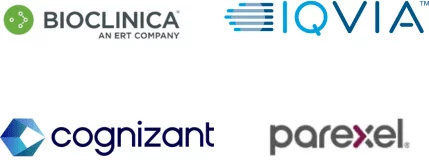
Want to become a Clinical Research Associate?
What Sets Clinical SAS Course Apart?

100% Placement Assistance
Strong network of recruiters from the healthcare, pharmaceutical, and biotechnology industries and offer placement assistance to students.
Industry Expert Trainers
Equip yourself with skills and knowledge under the mentorship of experienced faculties with over 17 years of experience in the field of healthcare research and training.
Learning Management System
Embark on a transformative learning experience with our state-of-the-art Learning Management System!
Non-Technical and Technical Sessions
Go beyond the textbook with a well-rounded foundation balancing essential technical and non-technical skills needed to thrive in healthcare, IT and Pharma.
Job Oriented Programs
Get comprehensive job-oriented programs to empower you with the skills and knowledge you need to succeed in the competitive healthcare sector.
Clinical SAS Course Curriculum
Introduction to the core syntax and programming concepts of SAS, including data step processing, PROC steps (like PROC PRINT, SORT, MEANS), data manipulation (e.g., merging, appending, datasets), and creating basic reports. It forms the bedrock for all subsequent analytical work.
Data management and integrity module focuses on parameters like quality, accuracy, and reliability of clinical trial data. This module covers data validation, cleaning, error identification, handling missing values, and implementing robust data integrity checks. It is just to ensure the data is suitable for analysis and regulatory submission.
This is a crucial module that delves into the Clinical Data Interchange Standards Consortium (CDISC) guidelines, which are globally mandated for clinical trial data submission to regulatory authorities like Foods and Drug administration. In this module you will cover SDTM (Study Data Tabulation Model) for organizing raw data and ADaM (Analysis Data Model) for creating analysis datasets, ensuring data traceability and consistency.
Statistical reporting in clinical trials teaches you how to generate various statistical reports required in clinical trials. This may include creating tables, listings, and figures (TLFs) for study results, adverse events, patient demographics, and efficacy/safety endpoints by using appropriate SAS procedures for statistical analysis (e.g., PROC TTEST, PROC ANOVA, and PROC FREQ).
Data visualization with SAS focuses on creating compelling and informative visual representation of clinical data using SAS graphical procedures (e.g., PROC SGPLOT, PROC GCHART). Participants design effective charts, plots, and dashboards to communicate valuable insights from clinical trials clearly and concisely.
Going beyond basics of statistics, this module introduces more sophisticated analytical methods applicable to clinical data. This might include survival analysis, logistic regression, mixed models, or other advanced statistical techniques for in-depth exploration of data relationships and prediction.
Regulatory compliance and submission provide a critical understanding of the regulatory bodies for clinical trials while adhering to guidelines from agencies like the FDA and EMA. It covers the process of preparing and submitting electronic clinical trial data packages (e.g., eCTD) in compliance with regulatory requirements, ensuring smooth review and approval processes.
FREE Career Counselling
We are happy to help you 24/7
A Student’s Journey



Industry-Ready Training
Equip yourself with skills and knowledge required to be successful in the healthcare-pharma or healthcare-IT industry. Enhance your communication and personality.
Certified Courses
Earn credentials through online or in-person programs validating the enhancement of your skills and expertise in the healthcare IT and pharma sectors.
Get Placed
Gain access to volunteer, internship, and placement opportunities and apply real-world applications in healthcare settings like hospitals, CROs, and pharma companies.
Level up your Career with Clinical SAS Training in Chennai.
Real people. Real results.
Master in-demand skills and knowledge
Propel your Healthcare career with CliniLaunch.

Unlock your potential Mentorship advantage
Personalized industry experts with career advice and support for your choices.

Navigate your medical career with confidence
Unlock your potential with upskilling in what you truly enjoy.

Why Clini Launch?
Industry Driven Curriculum
- Adapt to industry standards
- Gain in-depth knowledge
- Up to date your skill sets
Experienced Instructors
- Interact with seasoned professionals
- Insightful healthcare practices
- Dedicated industry experts
Hands-on Learning
- Live interactive session
- Integrated case studies
- Practical step guidance
Industry Recognized Accreditations
- International Accreditation Organization (IAO)
- International Accreditation Forum (IAF)
- National Skill Development Council (NSDC)
Career Support Services
- Access to Career support group
- Resume Building Workshops
- Placement Mentorship Program
FAQ's on Clinical SAS Training in Chennai
At Clini Launch, the typical duration for clinical SAs training in Chennai ranges from 3 to 6 months based on two courses provided under clinical SAS. One is for Certification in Clinical SAS and the other is Advanced Diploma in clinical SAS programs. The range of fees may vary from other courses; it is better to contact one of your career counsellors for the same. However, the varied fee structure indicates the modules you want to pursue for your future career goals.
Clini Launch Research Institute is frequently cited as a top institute for Clinical SAS training in Chennai with 100% placement assistance. Due to Clini Launch’s industry connection, large networking, focus on practical, and industry-relevant skills with accreditations from IAO, IAF, NSDC, and membership of LSSSD makes Clini Launch a reputable organization.
Those freshers completing Clinical SAS training in Chennai from Clini Launch can typically look for jobs including Junior clinical SAS programmer, Statistical Programmer, or Clinical Data Analyst, and more. This growing pharmaceutical and CROs (Contract Research Organizations) ensure a steady demand for these job roles.
Clinical SAS training in Chennai often tailors its curriculum to meet the specific demands of the local pharmaceutical and healthcare industries by focusing on:
- CDISC standards (SDTM, ADaM), which are crucial for regulatory submissions.
- Hands-on experience with real-world clinical trial data relevant to common therapeutic areas.
- Preparation for roles in CROs and pharma companies that have a significant presence in Chennai.
- Emphasis on data quality and validation, critical for regulated clinical research.
The most recognized Clinical SAS Certification Course is the SAS certified Clinical Trials Programmer Using SAS 9. It is the standard of the course that is offered to students at Clini Launch to prepare for Certification in Clinical SAS or Advanced Diploma in Clinical SAS. This certification specifically validates a professional’s proficiency in using SAS software for managing, analyzing, and reporting data from clinical trials, demonstrating their ability to adhere to industry standards and regulatory requirements.
The approximate cost for the official SAS Clinical Trials Programmer certification exam by SAS (e.g., Exam A00-280) is around $180 USD i.e., ₹15465. This fee may vary slightly by region and is typically paid directly to Pearson VUE, the exam administrator.
While there are no formal prerequisites in terms of previous SAS certifications, it is highly recommended to have a strong background in Base SAS and SAS Macro programming, understanding of CDISC SDTM and ADaM standards, familiarity with clinical trial processes, and practical experience in generating Tables, Listings, and Figures (TLFs) from clinical trial data before attempting the Clinical SAS certification exam.
By obtaining a Clinical SAS certification significantly boost career opportunities and salary potential by:
- Validating specialized Expertise: Proving to employers that you have a recognized level of proficiency in clinical SAS.
- Enhancing Employability: Pharmaceutical companies and CROs prefer or even require certified candidates.
- Increasing earning potential: Certified professionals typically command higher salaries due to their specialized skills.
- Opening doors to advanced roles: Obtaining a clinical SAS certification helps in career progression to lead or senior programming opportunities.
Following are the main advantages of choosing clinical SAS training online include:
- Flexible schedule to learn at your own pace, fitting around existing work or personal commitments.
- Accessibility to enroll from any location while eliminating travel time and costs.
- Often online programs have lower tuition fees and no associated expenses like accommodation, leading to its cost effectiveness.
- Access to recorded or live training sessions and content for better understanding and revisions.
Clinical SAS training online programs ensure hands-on learning and real-time project experience by:
- Providing access to cloud-based SAS environments or virtual machines
- Clini Launch’s live training classes offer downloadable SAS university edition or similar free software for self-practice.
- By integrating real-world clinical datasets for assignments and capstone projects.
- Utilizing interactive coding platforms and simulating industry scenarios to build practical skill sets.
Clinical SAS Training Online often provides comprehensive technical support through:
- Dedicated support for software installation and troubleshooting.
- Live, interactive Q&A sessions with instructors.
- Online discussion forums or community groups for peer-to-peer learning and doubt clearing.
- Screen sharing and remote assistance with coding issues.
- Regular assignments with feedback from instructors.
For a smooth experience with Clinical SAS Training Online, typical requirements include:
- A stable, high-speed internet connection (broadband recommended for live sessions).
- A modern computer (laptop or desktop) with sufficient RAM (8GB or more) and a decent processor.
- A functional webcam and microphone for interactive sessions.
- An updated web browser and potentially specific client software for accessing virtual SAS environments.
When choosing a Clinical SAS Institute, look for accreditations or affiliations that indicate quality and industry relevance:
- SAS Alliance Partner: This signifies a direct partnership with SAS, ensuring curriculum alignment with official SAS standards.
- ISO Certification: While not specific to SAS, it indicates a commitment to quality management systems.
- Industry body affiliations: Membership or recognition by relevant clinical research or pharmaceutical associations can be a good sign.
- University affiliations: Some institutes might collaborate with universities for specialized programs.
At a leading Clinical SAS Institute, students can expect faculty with:
- Extensive industry experience: Trainers who have worked as Clinical SAS Programmers, Statisticians, or Data Managers in CROs or pharmaceutical companies.
- SAS Certified Professional: Instructors who hold official SAS certifications.
- Strong domain knowledge: Expertise in clinical trial methodology, regulatory guidelines (FDA, ICH-GCP), and CDISC standards.
- Strong teaching abilities: Capacity to explain complex technical and clinical concepts clearly and engagingly.
A Clinical SAS Institute prepares students for real-world challenges by:
- Providing hands-on projects using messy, real-like clinical trial datasets.
- Simulating industry workflows for data cleaning, validation, analysis, and reporting.
- Emphasizing debugging skills and troubleshooting common programming errors.
- Incorporating case studies that reflect typical problems encountered in clinical trials.
- Teaching best practices for documentation and code reproducibility.
A good Clinical SAS Institute may offer post-training support beyond just placement, such as:
- Alumni networks: Connections with past graduates for networking and job referrals.
- Continued access to learning resources: Access to online labs, study materials, or updated content for a period after course completion.
- Refresher sessions or workshops: On advanced topics or new industry updates.
- Interview preparation and mock interviews tailored to specific job roles.
- Guidance on professional development and career progression paths.
A typical Clinical SAS Programming Online Course covers technical modules such as:
- Base SAS Programming: Data Step, PROC Step, functions, arrays, loops, I/O.
- Advanced SAS Programming: Macro language, SQL procedures, SAS/ODS (Output Delivery System).
- Statistical Procedures: PROC MEANS, PROC FREQ, PROC UNIVARIATE, PROC GLM, etc., relevant to clinical data.
- Data Visualization: Creating graphs and charts using SAS/GRAPH or ODS GRAPHICS.
- Debugging and error handling in SAS programs.
A Clinical SAS Programming Online Course ensures compliance with CDISC standards by:
- Dedicated modules on SDTM (Study Data Tabulation Model) and ADaM (Analysis Data Model).
- Hands-on exercises and projects focused on mapping raw data to SDTM and creating ADaM datasets.
- Teaching the creation of Define-XML, which is essential for regulatory submissions.
- Discussing CDISC controlled terminology and its application.
- Incorporating industry best practices for data standardization.
For a Clinical SAS Programming Online Course, specific software access typically involves:
- Cloud-based SAS environments provided by the institute (e.g., SAS Viya, SAS OnDemand for Academics).
- Guidance on installing and using SAS University Edition (a free, non-commercial version of SAS).
- Sometimes, access to a virtual machine (VM) pre-configured with SAS software.
- Learners will usually need a stable internet connection and a computer capable of running these environments.
A Clinical SAS Programming Online Course commonly includes projects and assignments such as:
- Data cleaning and validation tasks on messy, real-world clinical trial datasets.
- Creating SDTM datasets from raw data.
- Developing ADaM datasets for statistical analysis.
- Generating Tables, Listings, and Figures (TLFs) for various clinical study reports.
- Building automated SAS macros for repetitive programming tasks.
- End-to-end simulated clinical trial projects from data import to final report generation.
Clini Launch’s clinical SAS course online programs are designed to be beginner-friendly and suitable for individuals with no-programming experience. They typically start with fundamental SAS programming concepts, building up to more advanced topics. However, a strong logical aptitude and willingness to learn coding are essential for success.
The progress of students in a Clinical SAS Course Online is typically tracked and evaluated through:
- Regular quizzes and assignments on modules.
- Mid-course and end-of-course assessments or exams.
- Project submissions where students apply learned concepts to datasets.
- Participation in online discussions or live sessions.
- Code reviews and feedback on programming assignments.
Yes, Clinical SAS Course Online programs, especially those offered by private training institutes, often provide flexible payment options or installment plans. This makes the courses more accessible to a wider range of students by allowing them to spread out the cost over the duration of the program. It’s advisable to inquire about these options before enrollment.
Common Challenges faced by students in a Clinical SAS course online include:
- Technical Issues: Addressed by dedicated tech support, clear installation guides, and cloud-based platforms.
- Lack of immediate feedback: Mitigated by interactive live sessions, active discussion forums, and prompt feedback on assignments.
- Self-discipline: Countered by structured learning paths, regular deadlines, and engaging content.
- Understanding complex concepts: Addressed by clear explanations, supplementary materials, and Q&A sessions with instructors.
Following are the primary responsibilities of a professional involved in clinical SAS Programming include:
- To develop, test, and validate SAS programs to perform clinical data analysis.
- To create and manipulate SAS datasets from raw clinical datasets.
- To implement CDISC SDTM and ADaM standards for data standardization.
- To generate Tables, listings, and figures (TLFs) for clinical study reports.
- To perform data quality checks and validation of clinical trial data.
- Collaborate with professionals like biostatisticians, data managers, and medical writers.
Following are the difference between Base SAS programming and Clinical SAS programming lie in their application and context:
- Based SAS programming refers to the fundamental skills while using SAS for general data manipulation, analysis, and reporting to be communicated to diverse industries.
- Clinical SAS programming is a specialized Base SAS programming skill specifically within the highly regulated clinical trials domain. It involves adherence to industry standards like CDISC, understanding of clinical trial phases, and generation of reports for regulatory submissions.
Whether you are in Chennai or anywhere, understanding medical terminology and clinical trial processes is critically important for effective clinical SAS programming. It enables programmers to:
- Interpret clinical study protocols and statistical analysis plans accurately.
- Understand the meaning and context of clinical data variables.
- Identify data inconsistencies and potential errors.
- Communicate effectively with clinicians, biostatisticians, and data managers.
- Ensure that programmer outputs are clinically meaningful and regulatory compliant.
Besides SAS software, following are the tools and utilities commonly used on clinical SAS programming include:
- Text editors for writing and editing SAS code (e.g., Notepad++, Sublime Text).
- Version control systems like Git for managing code changes.
- CDISC validations tools such as (e.g., Pinnacle 21) for checking compliance of SDTM and ADaM datasets.
- Microsoft Office Suite (Excel for data viewing, Word for documentation).
- Communication Platforms (e.g., Microsoft Teams, Zoom) for collaboration.
The best Clinical SAS Training Institute distinguishes itself through:
- Industry-experienced and certified trainers with real-world project exposure.
- Comprehensive curriculum covering Base SAS, Advanced SAS, CDISC, and clinical trial concepts.
- Extensive hands-on practice with real or simulated clinical datasets.
- Strong placement assistance with a proven track record and industry connections.
- Up-to-date course material reflecting the latest industry trends and regulatory changes.
- Small batch sizes for personalized attention.
- Positive student testimonials and reviews.
The best Clinical SAS Training Institute ensures its curriculum remains updated by:
- Regularly consulting with industry experts and professionals to incorporate new technologies and best practices.
- Monitoring regulatory updates from bodies like FDA and EMA regarding data submission standards (e.g., CDISC).
- Reviewing feedback from placed students and employers to identify skill gaps.
- Integrating new SAS features and programming techniques as they emerge.
- Participating in industry conferences and workshops.
The best clinical SAS training institute offers various networking opportunities, such as:
- Fast Foward Guest Series (A Guest Lecture) offered by Clini Launch from industry professionals and experts on advanced topics.
- Industry collaboration projects or internship opportunities.
- Strong connections with recruiters and HR departments of top pharma and CRO companies.
Clini Launch offers a dedicated placement cell for the best clinical SAS training institute in Chennai. It plays a vital role in:
- Bridging the gap between students and potential employers
- Providing tailored resume building and interview preparation sessions for students.
- Facilitating mock interview rounds and skills assessment tests.
- Organizing campus placement, job fairs, and direct referrals.
- Offering continuous support until a student secures a suitable job role.
Clinical SAS online training typically manages practical lab access and software licensing by:
- Providing students with cloud-based access to SAS software (e.g., SAS studio, SAS Viya) via remote servers.
- Guiding students on how to download and install SAS university edition (a free version for learning and non-commercial use) on their personal computers.
- In some cases, providing virtual machine (VM) images pre-configured with the necessary SAS environment.
It is to ensure that students have continuous access to practice environments throughout the course duration.
The typical assessment and feedback mechanism in a Clinical SAS Online Training program involves:
- Regular coding assignments and quizzes after each module
- Automated code checkers or peer review systems for initial feedback
- Instructor-graded projects with detailed feedback on code quality, logic, and adherence to standards.
- Live Q&A sessions and dedicated forums for students to ask questions and receive clarification.
- Mock exams to prepare for certification.
Clinical SAS Online Training ensures engagement and interaction in a virtual environment through:
- Live, interactive classes with real-time Q&A and polling features.
- Breakout rooms for group discussions and collaborative problem-solving.
- Dedicated communication channels (e.g., Slack, WhatsApp groups) for continuous interaction outside live sessions.
- Interactive coding exercises and hands-on projects.
- Guest speakers from the industry.
- Regular feedback loops from instructors.
Yes, you can expect the same level of industry recognition from Clinical SAS online training from an offline course also, provided the online program is:
- Offered by Clini Launch holding international accreditations with experienced trainers.
- Covers the same comprehensive curriculum including CDISC standards and real-world projects.
- Prepares for official SAS certifications, which are globally recognized regardless of the training mode.
- Offers strong placement support and successful alumni. The key is the quality and depth of training, not just the mode of delivery.
In general, the eligibility criteria for enrolling in a clinical SAS course typically include:
- A bachelor’s or master’s degree in Life Sciences (e.g., Pharmacy, Biotechnology, Microbiology, Biochemistry, Zoology, Botany).
- A degree in Statistics, Mathematics, or Computer Science.
- Medical Professionals Like MBBS, BDS, BAMS, BHMS.
Clini Launch considers candidates with a strong aptitude for programming and relevant industry experience even without a direct scientific background.
A Clinical SAS course prepares students for data validation and quality control by:
- Teaching various SAS programming techniques to identify inconsistencies, outliers, and missing data.
- Covering the creation of validation programs and data quality checks.
- Emphasizing the importance of audit trials and documentation.
- Introducing industry best practices for data integrity and data cleaning in accordance with regulatory guidelines.
- Providing hands-on experience in resolving data queries.
The typical career growth trajectory for a clinical SAS professional in India can progress from:
- Junior/Associate Clinical SAS Programmer (Fresher)
- Clinical SAS Programmer (1-3 years’ experience)
- Senior Clinical SAS Programmer (3-6 years’ experience)
- Lead Clinical SAS Programmer (6+ years’ experience)
- Principal Programmer/Manager of Statistical Programming
Furthermore, specializations into job roles like statistical lead, Biostatician (with additional statistical expertise), or Clinical Data Manager.
The key skills (both technical and soft) that a clinical SAS course aims to develop in students are given below.
Focusing on Technical Skills, you need to develop:
- Proficiency in base and Advanced SAS programming
- Mastery of CDISC standards (SDTM, ADaM).
- Ability to generate Tables, Listings, and Figures (TLFs).
- Data cleaning, validation, and manipulation skills.
- Understanding clinical trial concepts and regulatory guidelines.
Following are the soft skills that you need to develop for your career growth and expansion:
- Problem-solving and analytical thinking
- Attention to detail and accuracy.
- Communication skills (Written and Verbal) for interacting with cross-functional teams.
- Teamwork and collaboration
- Time management and organizational skills.
For working professionals, a Clinical SAS online Course offers key advantages such as:
- Flexibility: Ability to learn at one’s own pace and schedule, without interrupting current employment.
- Accessibility: Access to high-quality training from anywhere, eliminating geographical constraints.
- Self-paced learning options: Allowing deeper engagement with complex topics as needed.
- Cost and time savings: Reduced or eliminated commuting time and costs compared to in-person classes.
A clinical SAS online course ensures that students gain sufficient hands-on experience without a physical classroom by:
- Providing cloud-based access to SAS software or virtual lab environments.
- Offering detailed instructions and support for installing SAS University Edition or similar free versions.
- Integrating numerous real-world clinical datasets for practical exercises and assignments.
- Incorporating capstone projects to simulate industry scenarios requiring students to apply their programming skills from start to finish.
A clinical SAS online course includes interactive features to facilitate exclusive learning opportunities such as:
- Live, instructor-led sessions with Q&A functionality and screen sharing.
- Dedicated online forums like learning management system for peer-to-peer interaction and instructor support.
- Integrated development environment (IDEs) within the online platform for coding practice.
- Regular quizzes, polls, and interactive assignments to test understanding.
- Opportunities for one-on-one sessions with instructors for personalized feedback.
For a smooth transition into a clinical SAS online course, essential technical prerequisites include:
- A basic understanding of computer operations and file management.
- Familiarity with using web browsers and online communication tools.
- A reliable internet connection.
- A personal computer with sufficient processing power and RAM (typically 8 GB or more) to run SAS software or access cloud-based environments.
- No Prior SAS programming knowledge is usually required, as clinical SAS online course at Clini Launch starts from the basics.
A Clinical SAS programming Course specifically emphasizes:
- Source data handling: Importing and transforming raw data from various sources (e.g., CRFs, external labs).
- Data Cleaning and Validation: To identify and resolve discrepancies, missing values, and logical errors.
- Standardization: Must adhere to CDISC standards like SDTM and ADaM for consistency and regulatory compliance.
- Derivation of new variables: Creating analysis-ready variables required for statistical analysis.
- Output generation: Producing accurate and visually clear tables, listings, and figures (TLFs) for clinical study reports.
A clinical SAS programming course incorporates regulatory guidelines by:
- Providing modules introducing ICH-GCP (International Conference on Harmonization- Good Clinical Practice) principles relevant to data handling and programming.
- Discussing FDA (U.S. Food and Drug Administration) and EMA (European Medicines Agency) requirements for electronic data submissions.
- Emphasizing the importance of data traceability, audit trials, and validation documentation to meet regulatory scrutiny.
- Implementing CDISC Standards mandated by these regulatory bodies.
In a Clinical SAS programming Course, these are the common statistical procedures that are taught for data analysis using SAS include:
- Descriptive Statistics: PROC MEANS, PROC FREQ, PROC UNIVARIATE for summarizing data.
- Inferential statistics: PROC TTEST (for comparing means), PROC ANOVA (for analysis of variance), PROC GLM (for general linear models), PROC REG (for regression analysis).
- Categorical data analysis: PROC FREQ with CHISQ option for associations between categorical variables.
- Survival analysis: Basics of PROC LIFETEST or PROC PHREG (for Cox regression) might be introduced in more advanced courses.
A Clinical SAS programming Course prepares students for working with large and complex clinical datasets by:
- Teaching efficient data manipulation techniques using SAS DATA steps and PROCs for large volumes of data.
- Covering performance optimization techniques in SAS programming.
- Providing hands-on practice with simulated real-world large datasets to manage and analyze.
- Introducing concepts of data merging, appending, and restructuring for complex data relationships.
- Emphasizing the use of SAS macros for automating repetitive tasks, which is crucial for handling large-scale projects.
Clini Launch recent placed students
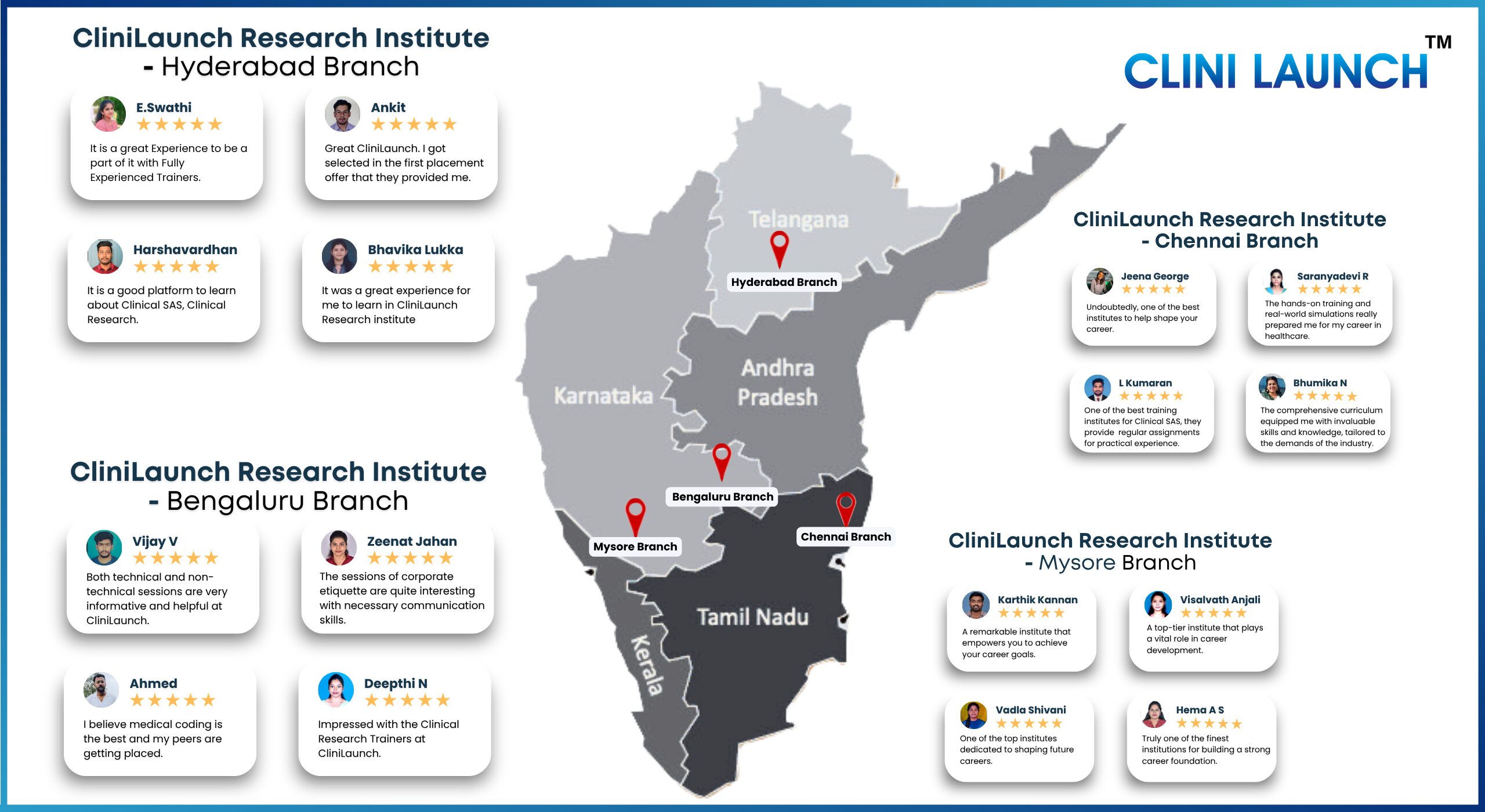
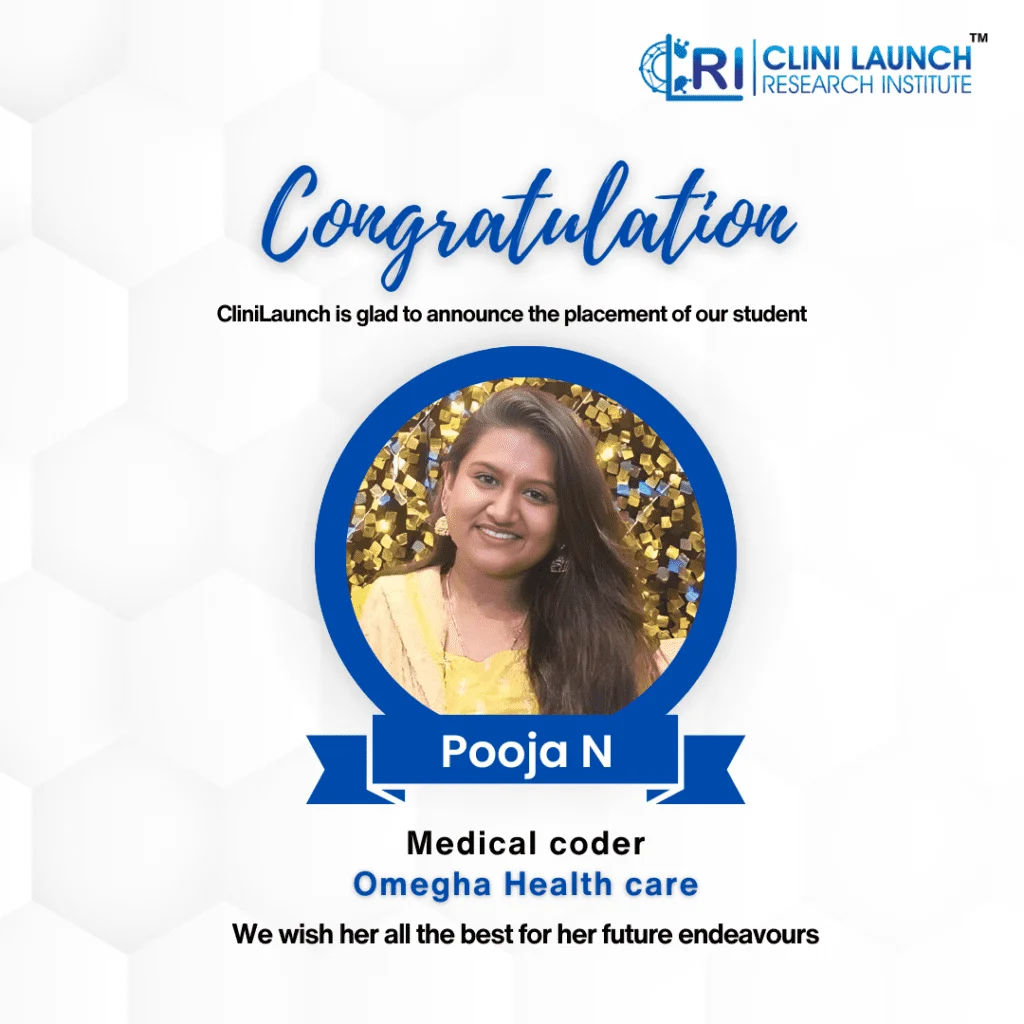


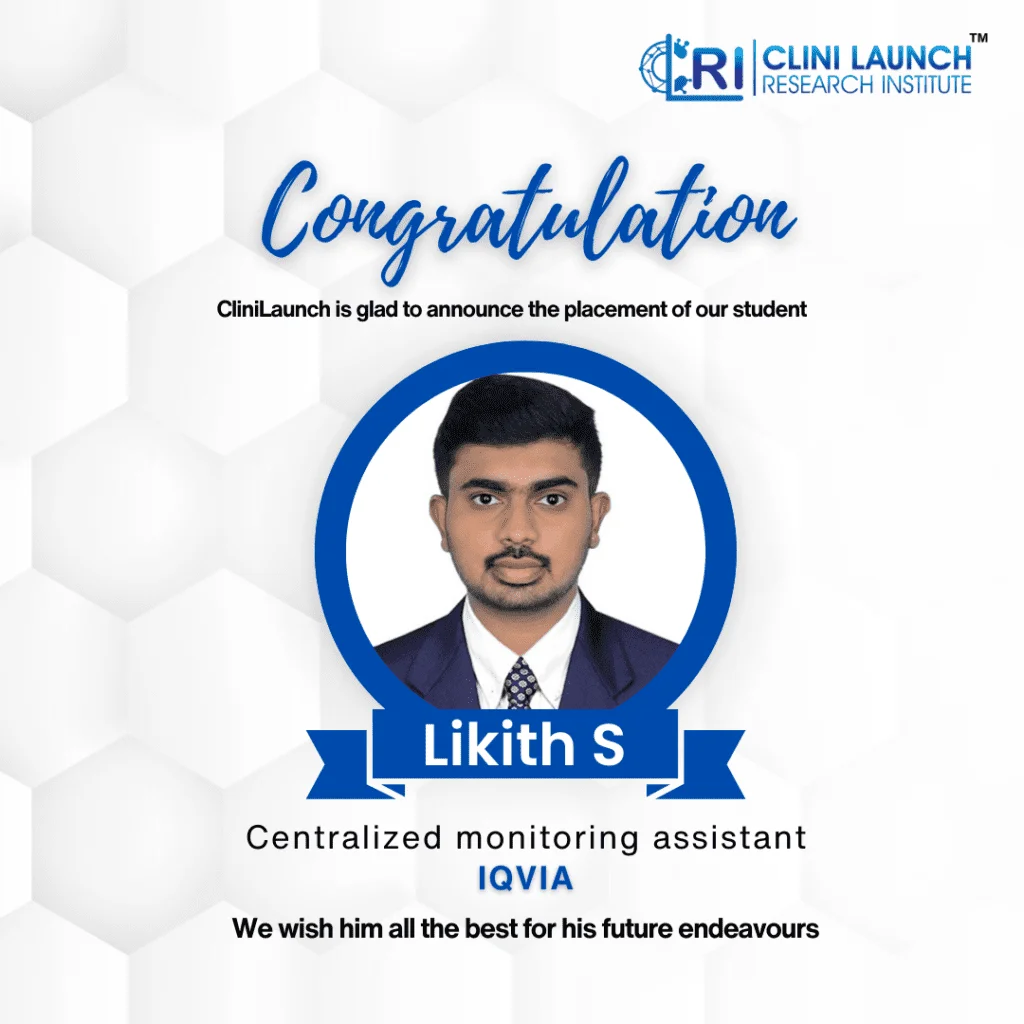
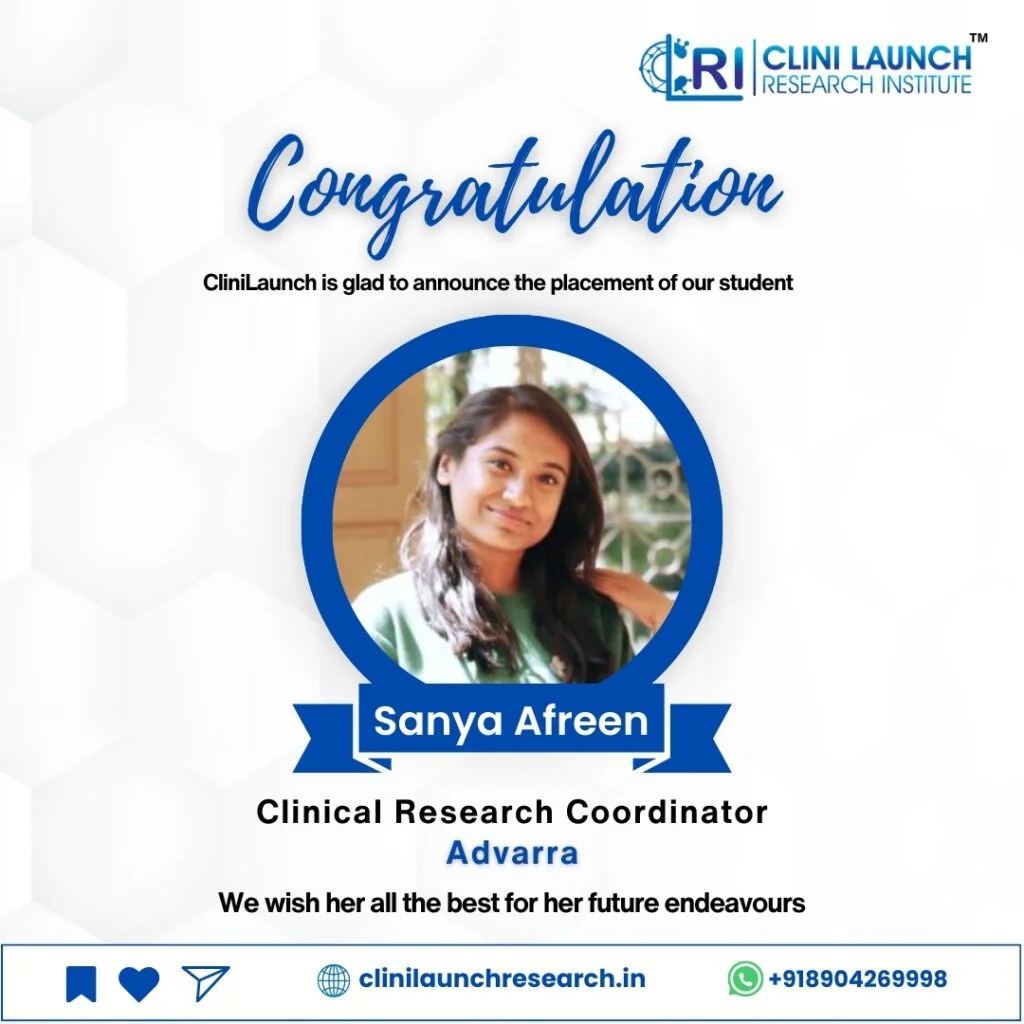

Testimonials
Upskilling does make a difference. Graduates speak out. Hear what our students and professionals are saying about their upskilling journey with Clini Launch.
100% Placement Assistance
Strong network of recruiters from the healthcare, pharmaceutical, and biotechnology industries and offer placement assistance to students.

